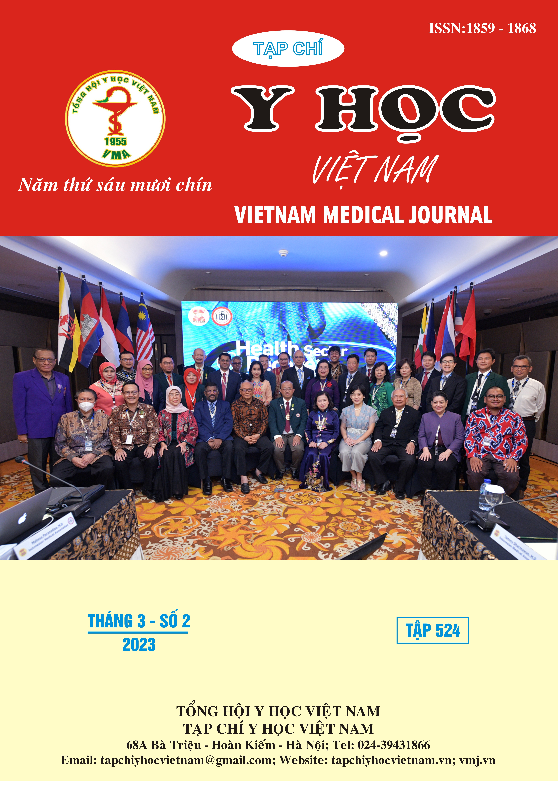INITIAL RESULTS ON APPLICATION OF MULTIPLE METHODS TO TREATMENT RECTAL CANCER FOR PATIENTS UNDERGOING SPHINCTER-SAVING LAPAROSCOPIC PROCTECTOMY AT E HOSPITAL
Main Article Content
Abstract
Objective: Evaluation of the results of applying multimodality in the treatment of rectal cancer in the group of patients undergoing sphincter-preserving laparoscopic proctectomy at E hospital. Subjects and methods: This is a retrospective descriptive study on a group of patients diagnosed with rectal cancer and treated by laparoscopic colorectal resection with lymphadenectomy at the Department of General Surgery – E Hospital in the period from May 2021 to November 2022. Results:The total number of patients in the study was 42 patients including 69% men and 31% women, with a mean age of 65.07 ± 11.2 years. The average operative time was 247.7 ± 46.5 minutes. The mean intraoperative blood loss was 27.3 ± 8.4 ml. Time for re-feeding after surgery is 5.3 ± 1.4 days. Postoperative defecation time 5.9 ± 1.3 days. There were no complications during surgery, complications of anastomosis were encountered in 3 cases (7.1%), intra-abdominal bleeding in 1 case (2.4%), pneumonia in 4 cases (9.5%). wound infection 6 cases (14.3%), intestinal obstruction 2 cases (4.8%), urinary retention after surgery 1 cases (2.4%). The mean postoperative time was 12.7 ± 3.8 days. Conclusion: Laparoscopic surgery for rectal cancer at E Hospital is a safe method with few of intra-operation accident and post-complications.
Article Details
Keywords
Laparoscopic surgery for rectal cancer, rectal cancer
References
2. Zhang Q, Liang J, Chen J, Mei S, Wang Z. Outcomes of Laparoscopic Versus Open Surgery in Elderly Patients with Rectal Cancer. Asian Pacific journal of cancer prevention: APJCP. Apr 1 2021;22(4):1325-1329. doi:10.31557/APJCP.2021.22.4.1325
3. Li Z, Xiong H, Qiao T, et al. Long-term oncologic outcomes of natural orifice specimen extraction surgery versus conventional laparoscopic-assisted resection in the treatment of rectal cancer: a propensity-score matching study. BMC surgery. Jul 25 2022;22(1):286. doi:10.1186/s12893-022-01737-2
4. Seishima R, Miyata H, Okabayashi K, et al. Safety and feasibility of laparoscopic surgery for elderly rectal cancer patients in Japan: a nationwide study. BJS open. Mar 5 2021;5(2)doi:10.1093/bjsopen/zrab007
5. Zhu Y, Xiong H, Chen Y, et al. Comparison of natural orifice specimen extraction surgery and conventional laparoscopic-assisted resection in the treatment effects of low rectal cancer. Scientific reports. Apr 29 2021;11(1):9338. doi:10.1038/s41598-021-88790-8
6. Teurneau-Hermansson K, Svensson Neufert R, Buchwald P, Jorgren F. Rectal washout does not increase the complication risk after anterior resection for rectal cancer. World journal of surgical oncology. Mar 19 2021;19(1):82. doi:10.1186/s12957-021-02193-7
7. Liu C, Li X, Wang Q. Postoperative complications observed with robotic versus laparoscopic surgery for the treatment of rectal cancer: An updated meta-analysis of recently published studies. Medicine. Sep 10 2021;100(36):e27158. doi:10.1097/MD.0000000000027158
8. Lohsiriwat V, Jitmungngan R. Rectovaginal fistula after low anterior resection: Prevention and management. World journal of gastrointestinal surgery. Aug 27 2021;13(8):764-771. doi:10.4240/wjgs.v13.i8.764


